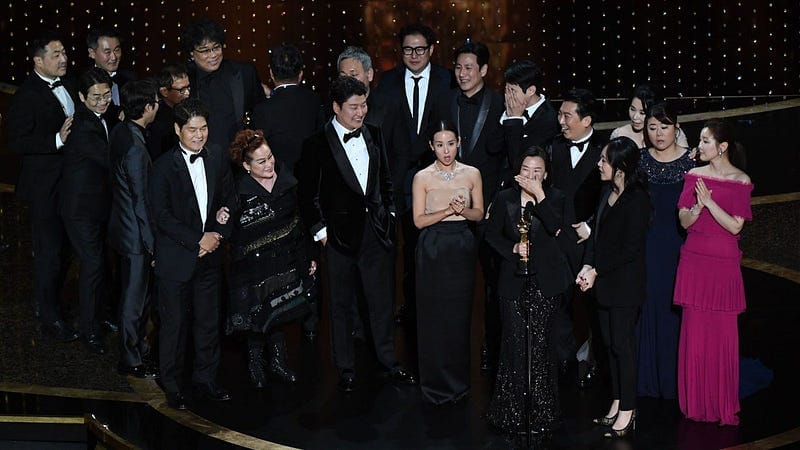Thoughts on the Oscars — 2019 Edition

I haven’t seen Parasite yet and have no opinion on it’s merit of it’s award-worthiness, but it seems to be loved by anyone who sees it. So I will go with the consensus that it’s great. With that it seems really cool that it won Best Picture this past Sunday at the 92nd Academy Awards. It is whatever adjective works for you- groundbreaking, historic, game changing- but frankly it was surprising, to everyone. My twitter feed was filled with people saying that they wish Parasite would win, be knew that it wouldn’t, then freak out minutes later when the impossible happened. And all that makes total sense.
This is a movie that was from South Korea, has subtitles, and is in a satirical horror/thriller genre. Three giant strikes that any one would traditionally be a disqualifier. But the times are a changing and it’s great.
Going back to my point in an earlier article, the Oscars are an advertisement for both Hollywood and the movies represented each year. And for good reason, this is a giant boost for Parasite. I personally have been interested in watching it, with word of mouth putting on my radar, but haven’t chosen to prioritize it in my busy schedule. But with this win, it has jumped up my to the top of my must watch list. And I feel safe say that I am not the only one, as it’s box office has already seen a heavy boost in traffic. The same thing happened a few years back with Moonlight, another off-beat underdog darling. What is so great about this, is that not only does this small foreign film get a spotlighting seal of approval from the mainstream film governing body, it also gives hope in a time when diversity is still a pain point in Hollywood. It shows that while structural, systemic change is a slow and grueling, it is working.
As I stated previously, and is well-know in entertainment circles, the Oscars have less to do with pure merits of a film and more to do with politicking and wooing people. And that’s okay. Parasite hit a perfect storm of a diversifying pool of voters, an affable, humble, and likable director, and most importantly a great film.
I personally was pulling for Once Upon a Time in Hollywood, a film that I thought was just okay (but has grown on me), but had a nostalgic sense, to the team and vibe of the film, of Old Hollywood. A mercurial but beloved director, two top of the top A-listers headlining the film, and the film itself an homage to an era gone by of Hollywood (that itself was about struggling to reconcile for an era gone by; very meta, I know), it hit all of the traditional markings of an Oscar juggernaut. I grew up enjoying the years when there was a favorite from traditional Hollywood and the night becoming a celebration of those people. I’m a sentimentalist at heart for the idea of Hollywood and its history (while fully aware of its also dark and troubled past). I was thinking that could be this year’s Oscars. In decades past that is what it would have been. A race between to Hollywod icons, Tarantino vs Scorsese, mob movie epic vs Hollywood epic. But that is not what the night turned out to be.
As the night progressed, it became what many of the recent Oscar ceremonies have become. A doling out of awards, balanced among the films and nominees, with everyone getting something, along with a big surprise or two sprinkled throughout. This year, much like the year of Moonlight, offered the shock in the biggest category, Best Picture. In 2017, Moonlight won against the favorite, another story about Hollywood, ironically, in a stunner (both win and debacle of an announcement) to take home the top prize, leading the way for Parasite’s big finish this year.
But Best Picture isn’t the only category that has shown progress in diversify its field. What actually gave Parasite a shot at Best Picture was slightly earlier in the night, when its director, Bong Joon Ho, won best director. This was after the film already picked up Best International Film and Best Original Screenplay. Bong is the ninth out of ten, foreign born director’s to win the award this past decade. The fifth of non-white director in the decade. The second of a non-english film. This shows that having diverse voices brings unique stories and points of view and are worthy of peer recognition. But this also proves that there is more to be done. There are still many groups of people under represented and under recognized by the industry in its higest profile, public face events. But while more and different groups need to be acknowledged, appreciating that change is happening is important, to continue the hard work and build on top of what is working.
There has been much handwringing over the Oscars the past decade, facing all sorts of pressures from all sides. While it’s ratings decline each year people wonder if they should include more mainstream films, others complain about the current merit of the films nominated, along with the lack of diversity amongst their top categories. The truth is the Oscars are changing, albeit slowly. Maybe painfully slow. By both cultural change around them, and a necessaity to stay relevant, they are no longer the arbiter of the popular zeitgeist (the Twitter-verse claims that crown). They must now, and are, the purveyors of lesser known, unconventional films and voices that deserve to be known by and presented to the greater masses. The Oscars are imperfect, they can be messy, they can be frustrating, but when they work, they show us the movies are our greatest shared cultural expression, reminding us why everyone should go to the movies.





Comments ()